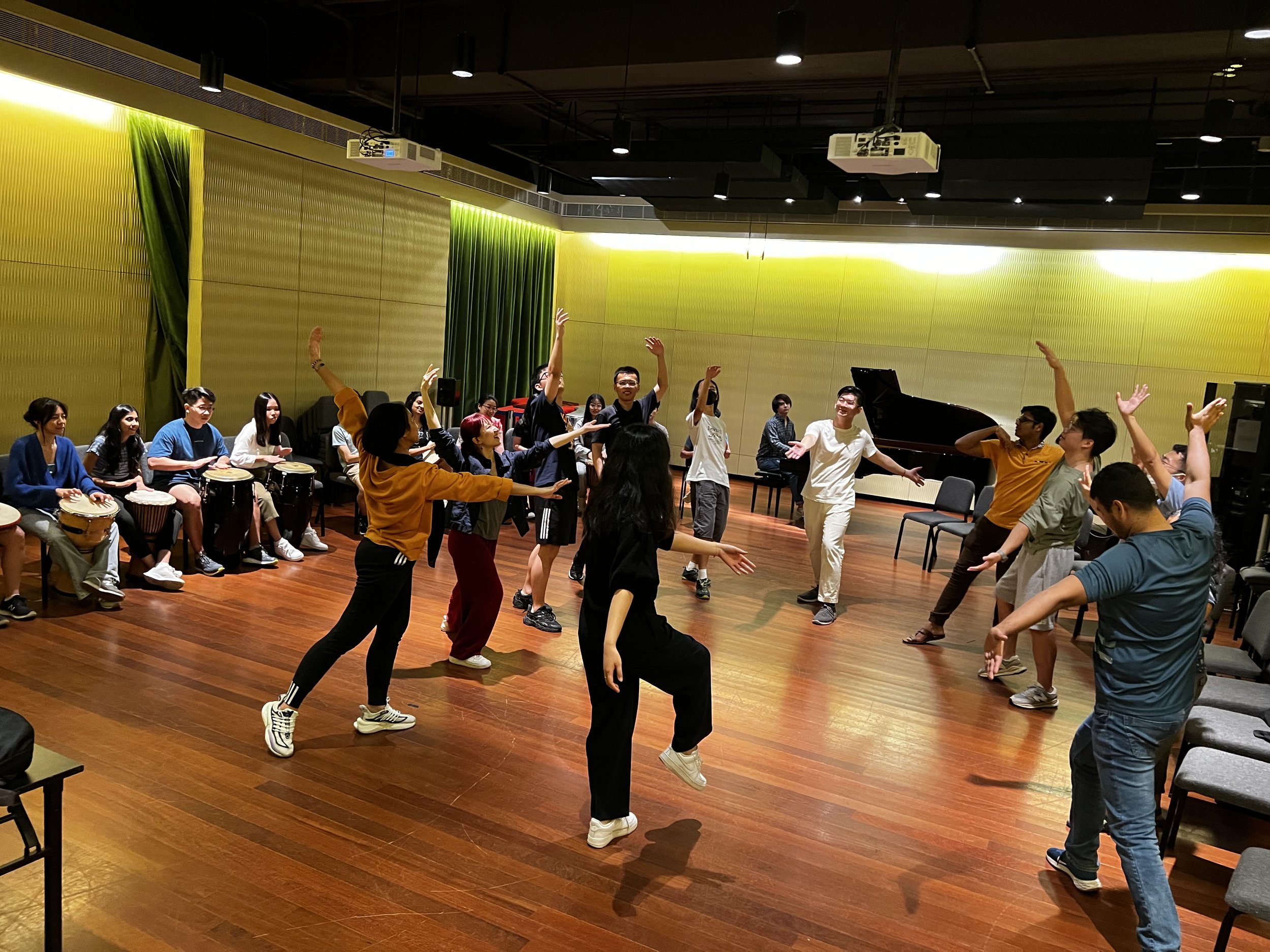Movin’ and Groovin’ for Wellness
ABOUT MOVIN’ AND GROOVIN’ FOR WELLNESS (MGW)
Movin’ and Groovin’ for Wellness (MGW) is the Centre of Music and Health’s flagship programme. It is designed as a music and dance-based approach to support students’ mental, social, and emotional health, with no stigma attached.
In these sessions, students across different NUS faculties come together for a 2-hour stress-relieving session of dancing, drumming, and jamming with professional musician and dance facilitators.
Improvisation is the main mode used to guide participants as they engage in music and dance. Research by MacDonald & Wilson has found that improvisation is associated with improvements in mental health, reductions in stress and anxiety, and improved communication. Through these sessions, participants cultivate their creative expression through these two artistic mediums.
The role of creative expression in supporting health and well-being has become doubly important in recent years, as a mental health crisis has spread around the world. Research by Harish et al. has found that even before the 2020 pandemic, young adults were found to have the highest incidence of mental illness in Singapore, and recently, students have also been grappling with pandemic-related anxiety and depression. Both music and dance programmes have been shown to be effective for supporting mental health, and since emerging from the pandemic, in-person arts activities have been a viable platform for supporting health and well-being.
A Jam Session with both drumming and dancing groups coming together
MEASURING THE IMPACT
At the start of each MGW session, students are first introduced to the programme before being divided into two groups - half with the drumming facilitator, and half with the dance facilitator, after which the groups switch. At the end, both groups come together for a combined drumming and dancing “jam session” together with student musicians from the Yong Siew Toh Conservatory of Music (YST).
The mood and expression started out light and calm, and as the students beat their drums in sync, the musicians caught on and started breaking out into livelier grooves of Latin music. Before leaving, the students completed an anonymous questionnaire about their experiences, impact on their mood, sense of social bonding, what they liked most and least about the programme, and suggestions to further improve the programme.
At the time of writing, 100% of the 120+ students surveyed so far have reported an improvement in their mood. They highlighted that improvising helped them feel free to express themselves in a relaxing and non-judgmental space. Two of the first MGW sessions took place during NUS exam weeks, and the sessions were still very popular (over-subscribed), despite the busy time period, as students saw the value of the sessions for their well-being. When asked what their least favourite part of the programme was, many responded that they wished that there would be more such sessions in the future, and suggested having an MGW series to learn more about the different dance and drumming techniques.
With these amazing initial findings, we have received grant funding to investigate the impact of MGW on students’ health and wellbeing. In 2023, we conducted a randomised controlled trial (RCT) with mixed methods and found promising findings in relation to the programme’s impact on students mental health, social connection, and creativity. The paper was published in BMC Public Health in 2025. You can find the publication here: https://bmcpublichealth.biomedcentral.com/articles/10.1186/s12889-025-22552-3
Additionally, we are conducting a second study to investigate the impact of individual sessions on students. Please stay tuned for the results!
Programme UPDATES
-
With funding support (via a MAELab Research grant) from the NUS Mind Science Centre, we launched a 10-week version of MGW, in the form of a randomised controlled trial (RCT), to measure the effectiveness and impact of the programme. The RCT was completed in December, 2023. The results were published in BMC Public Health journal in 2025.
Additionally, a special instalment of the MGW took place at National Gallery Singapore as part of the Gallery Wellness Festival on 23 June 2023, 2.00-4.00pm. The event was open to members of the public aged 16 - 70.
-
Another grant was awarded - the HSS Seed Grant - to further test and develop the MGW program, including tailoring it for seniors.
With the support of this grant, we would test the impact of individual sessions’ impact on mental health, social connection and creativity.
-
The study on the MGW individual sessions’s impact is still ongoing. We will share more updates and disseminate results soon.
In addition, a pilot (non-research) MGW session for seniors will be held in October 2025 to explore how this program can be adapted for seniors to improve their health and wellbeing.

